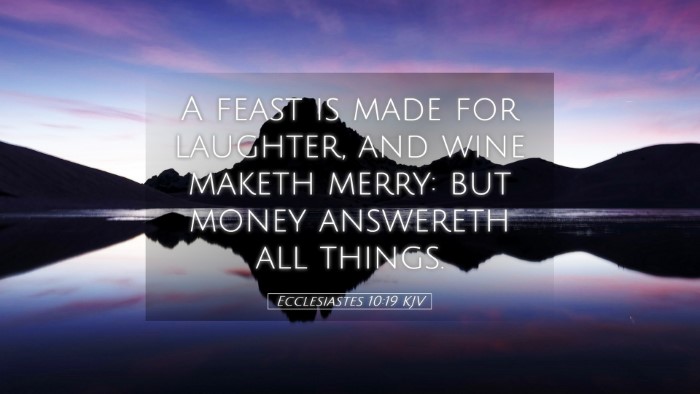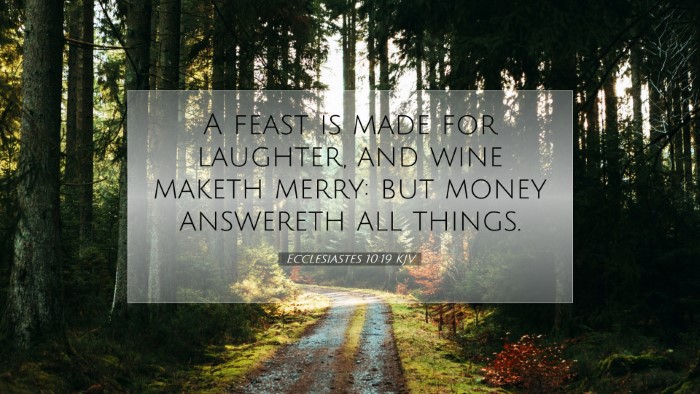Commentary on Ecclesiastes 10:19
Verse: "A feast is made for laughter, and wine makes merry; but money answers everything." (Ecclesiastes 10:19, ESV)
Context and Overview
The book of Ecclesiastes, attributed to Solomon, reflects on the nature of life and the pursuit of meaning. Chapter 10 addresses the folly and wisdom observed in various human behaviors. Verse 19 especially focuses on the relationships between feasting, merriment, and the underlying role of money in societal activities.
Exegesis of Ecclesiastes 10:19
This verse presents a notable contrast between two aspects of human experience: joy encapsulated in feasting and merriment versus the practicality of money. Each commentary provides insights into how these elements intertwine and the underlying message concerning the human condition.
Matthew Henry's Commentary
Matthew Henry emphasizes that this verse illustrates the superficiality of joy derived from external pleasures such as feasting and merriment. He posits, "A feast is made for laughter," indicating that while such gatherings might produce temporary joy, they often mask deeper realities of life governed by money. Henry notes that money, as stated, “answers all things” suggests its pervasive influence on life’s decisions and human interactions.
Henry further remarks on the necessity of money for functioning in society and the dangers of allowing it to dominate. He asserts that while money can facilitate happiness (as it provides means for sustenance and enjoyment), it should not be viewed as an ultimate source of fulfillment, which aligns with the broader theme of Ecclesiastes regarding the vanity of worldly pursuits.
Albert Barnes' Notes
Albert Barnes addresses the understanding of laughter and merriment in the social context of feasting. He elucidates that feasts, while structured socially for enjoyment, often act as mere distractions from the deeper pursuits of life, dominated by material considerations. Barnes interprets "money answers everything" as an acknowledgment of the fact that economic resources often dictate social interactions and emotional states.
He accords with Henry that while celebrations and laughter are valuable, there is a reality that they are underpinned by the ability to procure finances. In essence, Barnes highlights a paradox of human experience: joy is often tethered to something as mundane as finances.
Adam Clarke's Commentary
Adam Clarke provides a more nuanced exploration of the implications of this verse. He suggests that "a feast is made for laughter" presents an irony—while gatherings are meant for joy, the pursuit of laughter may be transient, influenced by the economic state of the individuals involved. Clarke elaborates that while wine may indeed facilitate merriment, it can also lead to excess and folly if viewed as a means to happiness.
On the theme of money, Clarke warns against the notion of equating financial security with happiness. He argues that although money has practical value in answering needs, genuine fulfillment transcends material wealth and speaks to spiritual and relational aspects of life. Clarke’s observations provoke a deeper inquiry into the balance between worldly joy and the eternal pursuits of the soul.
Theological Reflections
The reflections of these commentaries converge around a central theme: the juxtaposition of joy in life’s festivities against the backdrop of economic realities. For pastors, students, and scholars, this verse becomes a springboard for deeper discussions on how society balances material enjoyment with the spiritual pursuit of meaning.
Application for Pastoral Ministry
Pastors can draw from this verse to teach the congregation about the importance of finding joy in fellowship and the potential pitfalls of equating joy solely with material provisions. It provides a platform to explore what true happiness means in a consumer-driven culture.
Implications for Biblical Scholarship
Academics might consider the socio-economic implications of the text, exploring how ancient wisdom can relate to modern societal issues concerning wealth and happiness. This verse invites a critical examination of how religious teachings have historically interacted with economic realities, urging scholars to think critically about the relationship between materialism and spirituality.
Concluding Thoughts
Ecclesiastes 10:19 thus serves not only as a reflection on the human experience but also as a cautionary principle about the nature of joy and the role of money. The synthesis of insights from Henry, Barnes, and Clarke showcases the richness of biblical wisdom in addressing the complexities of life. Each commentator leads us to consider both the ephemeral joy of feasting and the more profound quest for lasting fulfillment beyond material wealth.


